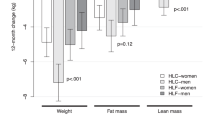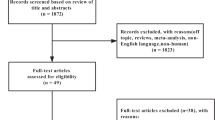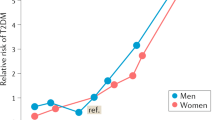Abstract
The increasing number of overweight and obese individuals has become one of the leading public health concerns in many countries around the world. Concomitant with this increase in the prevalence of obesity has been the rise in the number of weight-loss diets, many of which alter macronutrient composition, but with the majority focused on carbohydrate restriction. Low-carbohydrate diets are attractive because they promise rapid weight loss without having to count calories and compromise the consumption of many palatable foods. By contrast, traditional dietary recommendations for weight loss endorse a fat-restricted and calorie-restricted diet high in complex carbohydrates. Evidence indicates that low-carbohydrate diets could be better in terms of short-term weight loss relative to traditional low-fat diets, but little is known about their long-term utility and safety. Diets based on the traditional Mediterranean dietary pattern are becoming increasingly popular because of their healthful benefits, particularly regarding cardiovascular outcomes. Mediterranean diets encourage consumption of a variety of palatable foods, optimizing adherence and sustainability. In this Review we discuss the current evidence on the efficacy of low-fat, low-carbohydrate and Mediterranean dietary patterns for weight loss, their potential mechanisms of action and important clinical considerations.
Key Points
-
Many popular weight-loss diets are available, though for the majority, little is known about their long-term efficacy, safety and ability to improve parameters associated with the risk of cardiovascular disease
-
Traditional recommendations of fat restriction have been shown to have a negligible effect on long-term weight loss and do not offer any benefit in terms of reducing the risk of cardiovascular disease
-
Low-carbohydrate diets promote greater short-term weight loss than low-fat diets by conferring transient negative-energy balance, but long-term studies are needed
-
Traditional Mediterranean dietary patterns have been shown to improve cardiovascular disease risk factors and to reduce the risk of chronic diseases, though their effects on long-term weight control have not been convincingly demonstrated
-
Health-care professionals should encourage weight-loss strategies that are sustainable and beneficial for overall health
This is a preview of subscription content, access via your institution
Access options
Subscribe to this journal
Receive 12 print issues and online access
$209.00 per year
only $17.42 per issue
Buy this article
- Purchase on Springer Link
- Instant access to full article PDF
Prices may be subject to local taxes which are calculated during checkout



Similar content being viewed by others
References
Serdula MK et al. (1999) Prevalence of attempting weight loss and strategies for controlling weight. JAMA 282: 1353–1358
National Heart, Lung, and Blood Institute (online June 1998) Clinical Guidelines on the Identification, Evaluation, and Treatment of Overweight and Obesity in Adults [http://www.nhlbi.nih.gov/guidelines/obesity/practgde.htm] (accessed 27 October 2006)
Freedman MR et al. (2001) Popular diets: a scientific review. Obes Res 9 (Suppl 1): S1–S40
American Heart Association Nutrition Committee (2006) Diet and lifestyle recommendations revision 2006: a scientific statement from the American Heart Association Nutrition Committee. Circulation 114: 82–96
Deckelbaum RJ et al. (1999) Summary of a scientific conference on preventive nutrition: pediatrics to geriatrics. Circulation 100: 450–456
Ornish D (1997) Every Day Cooking with Dean Ornish. New York: Harper Collins
Willett WC (2002) Dietary fat plays a major role in obesity: no. Obes Rev 3: 59–68
Gross LS et al. (2004) Increased consumption of refined carbohydrates and the epidemic of type 2 diabetes in the United States: an ecologic assessment. Am J Clin Nutr 79: 774–779
Toubro S and Astrup A (1997) Randomised comparison of diets for maintaining obese subjects' weight after major weight loss: ad lib, low fat, high carbohydrate diet v fixed energy intake. BMJ 314: 29–34
Abete I et al. (2006) Different dietary strategies for weight loss in obesity: role of energy and macronutrient content. Nutr Res Rev 19: 5–17
Atkins R (1998) Dr. Atkins' New Diet Revolution. New York: Avon Books
Steward L et al. (2003) The New Sugar Busters!: Cut Sugar to Trim Fat. New York: The Ballantine Publishing Group
Sears B (1995) The Zone: A Dietary Road Map to Lose Weight Permanently. New York: Harper Collins
Agatston A (2003) The South Beach Diet: The Delicious, Doctor-Designed, Foolproof Plan for Fast and Healthy Weight Loss. New York: Random House
Brehm BJ et al. (2003) A randomized trial comparing a very low carbohydrate diet and a calorie-restricted low fat diet on body weight and cardiovascular risk factors in healthy women. J Clin Endocrinol Metab 88: 1617–1623
Crowe TC (2005) Safety of low-carbohydrate diets. Obes Rev 6: 235–245
Bravata DM et al. (2003) Efficacy and safety of low-carbohydrate diets: a systematic review. JAMA 289: 1837–1850
Astrup A et al. (2004) Atkins and other low-carbohydrate diets: hoax or an effective tool for weight loss? Lancet 364: 897–899
Buchholz AC and Schoeller DA (2004) Is a calorie a calorie? Am J Clin Nutr 79 (Suppl): S899–S906
Bray GA (2003) Low-carbohydrate diets and realities of weight loss. JAMA 289: 1853–1855
Nordmann AJ et al. (2006) Effects of low-carbohydrate vs low-fat diets on weight loss and cardiovascular risk factors: a meta-analysis of randomized controlled trials. Arch Intern Med 166: 285–293
Halton TL et al. (2006) Low-carbohydrate-diet score and the risk of coronary heart disease in women. N Engl J Med 355: 1991–2002
Serra-Majem L et al. (2006) Scientific evidence of interventions using the Mediterranean diet: a systematic review. Nutr Rev 64 (Suppl 1): S27–S47
Willett WC et al. (1995) Mediterranean diet pyramid: a cultural model for healthy eating. Am J Clin Nutr 61 (Suppl 6): S1402–S1406
Bray GA and Popkin BM (1998) Dietary fat intake does affect obesity! Am J Clin Nutr 68: 1157–1173
Howard BV et al. (2006) Low-fat dietary pattern and weight change over 7 years: the Women's Health Initiative Dietary Modification Trial. JAMA 295: 39–49
US Department of Agriculture and US Department of Health and Human Services (online 10 May 2005) Nutrition and Your Health: Dietary Guidelines for Americans. [http://www.health.gov/DietaryGuidelines/1990thin.pdf] (accessed 6 October 2006)
Jebb SA (2005) Dietary strategies for the prevention of obesity. Proc Nutr Soc 64: 217–227
McMillan-Price J et al. (2006) Comparison of 4 diets of varying glycemic load on weight loss and cardiovascular risk reduction in overweight and obese young adults: a randomized controlled trial. Arch Intern Med 166: 1466–1475
Liu S (2006) Lowering dietary glycemic load for weight control and cardiovascular health: a matter of quality. Arch Intern Med 166: 1438–1439
Howard BV et al. (2006) Low-fat dietary pattern and risk of cardiovascular disease: the Women's Health Initiative Randomized Controlled Dietary Modification Trial. JAMA 295: 655–666
Astrup A (1993) Dietary composition, substrate balances and body fat in subjects with a predisposition to obesity. Int J Obes Relat Metab Disord 17 (Suppl 3): S32–S36
McDevitt RM et al. (2000) Macronutrient disposal during controlled overfeeding with glucose, fructose, sucrose, or fat in lean and obese women. Am J Clin Nutr 72: 369–377
Flatt J (1985) Energetics of intermediary metabolism. In Substrate and Energy Metabolism in Man, 58–69 (Eds Garrow JS and Halliday D) London: John Libbey and Co
Hu FB (2005) Protein, body weight, and cardiovascular health. Am J Clin Nutr 82 (Suppl 1): S242–S247
Feinman RD and Fine EJ (2003) Thermodynamics and metabolic advantage of weight loss diets. Metabolic Syndrome and Related Disorders 1: 209–219
Sharman MJ et al. (2002) A ketogenic diet favorably affects serum biomarkers for cardiovascular disease in normal-weight men. J Nutr 132: 1879–1885
Fine EJ and Feinman RD (2004) Thermodynamics of weight loss diets. Nutr Metab (Lond) 1: 15
Segal-Isaacson CJ et al. (2004) A randomized trial comparing low-fat and low-carbohydrate diets matched for energy and protein. Obes Res 12 (Suppl 2): S130–S140
Halton TL and Hu FB (2004) The effects of high protein diets on thermogenesis, satiety and weight loss: a critical review. J Am Coll Nutr 23: 373–385
Brehm BJ et al. (2005) The role of energy expenditure in the differential weight loss in obese women on low-fat and low-carbohydrate diets. J Clin Endocrinol Metab 90: 1475–1482
Erlanson-Albertsson C and Mei J (2005) The effect of low carbohydrate on energy metabolism. Int J Obes (Lond) 29 (Suppl 2): S26–S30
Adam-Perrot A et al. (2006) Low-carbohydrate diets: nutritional and physiological aspects. Obes Rev 7: 49–58
Haymond MW et al. (1982) Differences in circulating gluconeogenic substrates during short-term fasting in men, women, and children. Metabolism 31: 33–42
Denke MA (2001) Metabolic effects of high-protein, low-carbohydrate diets. Am J Cardiol 88: 59–61
Yang MU and Van Itallie TB (1976) Composition of weight lost during short-term weight reduction: metabolic responses of obese subjects to starvation and low-calorie ketogenic and nonketogenic diets. J Clin Invest 58: 722–730
Schoeller DA and Buchholz AC (2005) Energetics of obesity and weight control: does diet composition matter? J Am Diet Assoc 105 (Suppl): S24–S28
Dansinger ML et al. (2005) Comparison of the Atkins, Ornish, Weight Watchers, and Zone diets for weight loss and heart disease risk reduction: a randomized trial. JAMA 293: 43–53
Covas MI et al. (2006) The effect of polyphenols in olive oil on heart disease risk factors: a randomized trial. Ann Intern Med 145: 333–341
McManus K et al. (2001) A randomized controlled trial of a moderate-fat, low-energy diet compared with a low fat, low-energy diet for weight loss in overweight adults. Int J Obes Relat Metab Disord 25: 1503–1511
Esposito K et al. (2004) Effect of a Mediterranean-style diet on endothelial dysfunction and markers of vascular inflammation in the metabolic syndrome: a randomized trial. JAMA 292: 1440–1446
Estruch R et al. (2006) Effects of a Mediterranean-style diet on cardiovascular risk factors: a randomized trial. Ann Intern Med 145: 1–11
Appel LJ et al. (2005) Effects of protein, monounsaturated fat, and carbohydrate intake on blood pressure and serum lipids: results of the OmniHeart randomized trial. JAMA 294: 2455–2464
Barzi F et al. (2003) Mediterranean diet and all-causes mortality after myocardial infarction: results from the GISSI-Prevenzione trial. Eur J Clin Nutr 57: 604–611
de Lorgeril M et al. (1999) Mediterranean diet, traditional risk factors, and the rate of cardiovascular complications after myocardial infarction: final report of the Lyon Diet Heart Study. Circulation 99: 779–785
Hu FB (2003) The Mediterranean diet and mortality—olive oil and beyond. N Engl J Med 348: 2595–2596
Vincent S et al. (2004) The Medi-RIVAGE study (Mediterranean Diet, Cardiovascular Risks and Gene Polymorphisms): rationale, recruitment, design, dietary intervention and baseline characteristics of participants. Public Health Nutr 7: 531–542
Castagnetta L et al. (2002) The Mediet Project. Ann N Y Acad Sci 963: 282–289
Knoops KT et al. (2004) Mediterranean diet, lifestyle factors, and 10-year mortality in elderly European men and women: the HALE project. JAMA 292: 1433–1439
Willett WC (2006) The Mediterranean diet: science and practice. Public Health Nutr 9: 105–110
Riccardi G et al. (2003) Glycemic index of local foods and diets: the Mediterranean experience. Nutr Rev 61 (Suppl): S56–S60
Willett WC (2001) Eat Drink and be Healthy: The Harvard Medical School Guide to Healthy Eating. New York: Free Press
Foster GD et al. (2003) A randomized trial of a low-carbohydrate diet for obesity. N Engl J Med 348: 2082–2090
Samaha FF et al. (2003) A low-carbohydrate as compared with a low-fat diet in severe obesity. N Engl J Med 348: 2074–2081
Yancy WS Jr et al. (2004) A low-carbohydrate, ketogenic diet versus a low-fat diet to treat obesity and hyperlipidemia: a randomized, controlled trial. Ann Intern Med 140: 769–777
Stern L et al. (2004) The effects of low-carbohydrate versus conventional weight loss diets in severely obese adults: one year follow-up of a randomized trial. Ann Intern Med 140: 778–785
Author information
Authors and Affiliations
Corresponding author
Ethics declarations
Competing interests
The authors declared no competing interests.
Rights and permissions
About this article
Cite this article
Malik, V., Hu, F. Popular weight-loss diets: from evidence to practice. Nat Rev Cardiol 4, 34–41 (2007). https://doi.org/10.1038/ncpcardio0726
Received:
Accepted:
Issue Date:
DOI: https://doi.org/10.1038/ncpcardio0726
This article is cited by
-
Impact of dietary counseling on the perception of diet in patients with gestational diabetes mellitus
Diabetology International (2021)
-
A Randomised Controlled Trial on the Effectiveness and Adherence of Modified Alternate-day Calorie Restriction in Improving Activity of Non-Alcoholic Fatty Liver Disease
Scientific Reports (2019)
-
The Metabolic Response to a Low Amino Acid Diet is Independent of Diet-Induced Shifts in the Composition of the Gut Microbiome
Scientific Reports (2019)
-
Interplay between diet and genetic susceptibility in obesity and related traits
Frontiers of Medicine (2018)
-
The effects of modified alternate-day fasting diet on weight loss and CAD risk factors in overweight and obese women
Journal of Diabetes & Metabolic Disorders (2013)



